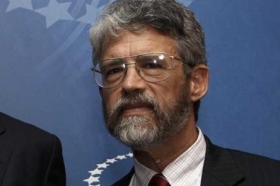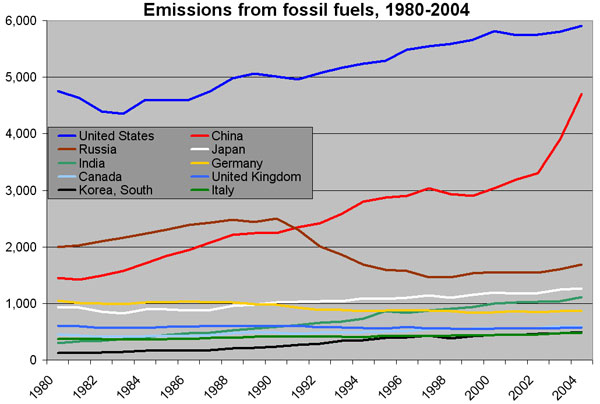Obama science advisor wields evidence to undercut climate change deniers

US President Barack Obama's science advisor, John Holdren, took on climate change deniers in a comprehensive, data-heavy speech last month at the Kavli Science Forum in Oslo, Norway. Proclaiming that "the earth is getting hotter", Holden went on to enumerate on the causes of climate change (human impacts) and its overall effect (not good), discussing at length the science that underpins the theory of climate change. For environmentalists and international officials frustrated with the US's slow pace on combating climate change—which is decades behind Europe's and many other nations'—Holdren touted that the Obama Administration had made progress on the issue and stated that the administration plans to pursue legislation again after a new congress is elected. However, given current predictions that Republicans will pick up seats in November, comprehensive climate and energy legislation seems unlikely since historically the majority of the GOP has been against tackling climate change.
Yet, Holdren argued that "most people are perhaps not sufficiently aware of the number of ways in which climate affects our well being," citing how climate impacts not just weather patterns, but availability of water; the productivity of agriculture, forests, and fisheries; the spread of disease; the need for funds to be spent on adaptation; and the survival of the world's species.
Much of Holdren's speech addressed what he called the "five myths" of climate change, including that argument that warming is natural, that climate change impacts are far on the horizon, and that climate change won't be bad for society. Systematically taking on each of these 'myths', often touted by climate change deniers, Holdren argued that for most of the world unmitigated climate change would mean massive disruptions to society and exponential increases in human suffering.
"[Current climate change] is rapid compared to the capacities for adjustment, the capacities of ecosystems, and the capacity of social and economic systems to adjust, and it is going to be harmful for most places and most times," Holdren said. "Some places for some time will get some benefits from climate change, but most places for most times and increasingly so going forward will suffer harm."
"The errors discovered so far are relatively few, and they are unimportant in terms of the fundamental understandings that I have been conveying here. And I kind of think it’s important to understand—some people imagine that the IPCC is the source of our understanding of climate—but in fact the IPCC is just one of the messengers," Holdren explained. |
The source, Holdren continued, of scientists' current understanding of climate change is thousands of rigorous studies from around the world conducted by researchers subject to the peer-review process, the very same scientific process that underpins everything from evolution to medical breakthroughs to theory of relativity.
For those that argue that climate change impacts are far in the future, Holdren said they are missing the evidence before their eyes
"We’re seeing variously in different places around the world more floods, more wildfires, more droughts, more heat waves, more pest outbreaks, more coral-bleaching events, increasing power of typhoons and hurricanes, expanded geographic range of tropical pathogens," Holdren said. "All of these plausibly link to climate change by theory, by models and by observed fingerprints—namely the patterns matching what you would expect if climate change were the cause."
He also dismissed the idea that the sun, and not greenhouse gas emissions, are behind the warming world.
"If you look at the recent data where we have particularly good satellite measurements of what the sun is doing, there is no increasing trend in the solar output to explain the rapid, recent increases in surface temperature of the Earth," Holdren said.
 Renewable energy makes up less than one percent of energy consumption in the United States according to the Energy Information Administration's Emissions of Greenhouse Gases in the United States 2004. |
"[The administration has] put climate change leaders in a variety of key positions, made climate change a priority in initiatives in departments and agencies, revitalized the US Global Change Research Program and other interagency efforts, working with other major emitting countries, both industrialized and developing, to build technology cooperation and individual and joint climate policies" Holdren said.
As to the failure to pass climate and energy legislation, Holdren stated: "we will be back. We will try anew in the next Congress. And in the meantime, the EPA is moving ahead to control greenhouse gas emissions by regulation."
Holdren added that the American public remained solidly behind efforts to reduce greenhouse gas emission citing a poll released in August that found 71 percent of Americans supported regulating carbon emissions and 61 supported an international treaty.
"It is still the case, widespread rumors to the contrary not withstanding, that the American public supports and continues to support taking action on climate change," Holdren said.

